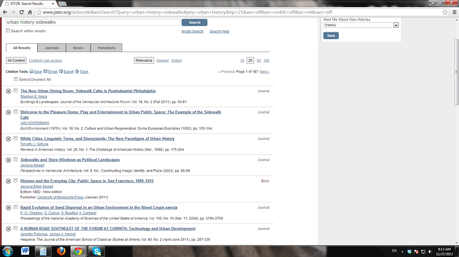Thanksgiving just passed, which means it's nearing the end of the semester. My guess is most students have a massive research paper due within the next few weeks. Skip Wikipedia and get acquainted with JSTOR, a one-stop research database that can direct you to a bunch of relevant peer-reviewed materials for your topic.
Peer-reviewed is the operative word here; it means that a scholar's work was vetted by his or her colleagues and passes the field's standards for quality, accuracy, and credibility.
Wikipedia, conversely, while valuable, is an open resource, which means anyone can contribute information, with or without conducting extensive research on a given topic.
Peer-reviewed journal articles, academic books, and primary source material are considered scholarly resources, which are the only kinds that count when you are writing a university-level paper.
Do not hand in a paper that references information you found on Wikipedia, some guy's blog, and one of those websites with lots of blinking graphics and comic sans font.
Peer-reviewed is the operative word here; it means that a scholar's work was vetted by his or her colleagues and passes the field's standards for quality, accuracy, and credibility.
Wikipedia, conversely, while valuable, is an open resource, which means anyone can contribute information, with or without conducting extensive research on a given topic.
Peer-reviewed journal articles, academic books, and primary source material are considered scholarly resources, which are the only kinds that count when you are writing a university-level paper.
Do not hand in a paper that references information you found on Wikipedia, some guy's blog, and one of those websites with lots of blinking graphics and comic sans font.
JSTOR Basic Search
JSTOR, which stands for "Journal Storage," is available through most schools' library websites. Universities and colleges have institutional subscriptions, which means students can access not only citations, but most of the journal articles themselves for free.
In other words, it'll save you many trips to the library.
[Click images throughout for bigger image of screenshots.]
In other words, it'll save you many trips to the library.
[Click images throughout for bigger image of screenshots.]
If you are not redirected to the site through your university's library, sign up for your own account at jstor.org. Once you are signed in, you can run a general or advanced search, depending on how specific you want to get.
Start with a Basic search. Assume I am working on a paper for my Urban History class. The professor assigned us to research the history of a specific aspect of city living.
I've already thought over what topics I might want to write about: streets, parks, train stations, a city zoo.... All seem potentially interesting, but I'm not sure about which direction I want to take my paper until I've seen what information is out there.
Now, there are more and less effective ways to tackle the preliminary research. Sure, I can type in "Urban History" if I want to sort through 437, 657 entries. However, if I have the idea to trace the rise of sidewalks in urban spaces, I can input the much more specific "urban history sidewalks," I get the entries back to a more manageable and immediately relevant 4,670.
Start with a Basic search. Assume I am working on a paper for my Urban History class. The professor assigned us to research the history of a specific aspect of city living.
I've already thought over what topics I might want to write about: streets, parks, train stations, a city zoo.... All seem potentially interesting, but I'm not sure about which direction I want to take my paper until I've seen what information is out there.
Now, there are more and less effective ways to tackle the preliminary research. Sure, I can type in "Urban History" if I want to sort through 437, 657 entries. However, if I have the idea to trace the rise of sidewalks in urban spaces, I can input the much more specific "urban history sidewalks," I get the entries back to a more manageable and immediately relevant 4,670.
Start Digging
I can also get more specific results by using the Advanced Search feature. You can limit the type of publication (journal, book, pamphlet, reviews, other), have it only include entries that you can immediately access online, and select specific disciplines (and journals within each field) to draw from.
Accessing An Article
If you are looking for primary source material as well, one option is to sort results Oldest to Newest. Remember - less recent articles can be approached as sources themselves. Now let's say I'm interested in doing something about sidewalks in an American city, and I come across this:
I select the PDF and -BOOM!- there's your article, no trip to the library required!
All that front matter is important - you need to cite that information if you reference the material in the paper. Since this particular example if from 1914, I would suggest treating it as a source, and look for more relevant scholarly literature offering analysis and arguments about the historical role of sidewalks in urban development.
Source-GUided Content
Ultimately, you need to write a paper based on the information you DO have, not the evidence you wished you had. It's fine to start out with a particular thesis or hypothesis and then modify the paper's content to reflect what the sources suggest.
If you are writing a research paper, you need to engage with the sources to provide a compelling argument. Present material that confirms your own argument, but make sure to include the counterargument as well. Then, with additional evidence, address why you find the counterargument lacking.
If you are writing a research paper, you need to engage with the sources to provide a compelling argument. Present material that confirms your own argument, but make sure to include the counterargument as well. Then, with additional evidence, address why you find the counterargument lacking.
Other Research Databases
JSTOR is not the only option, but I highlight it because it is easy to use and most institutions have a subscription. That being said, here are a few more general research databases:
Keep in mind there are also databases specific to a certain field of study. If you are looking for information on archival documents available in Europe, you should spend less time on JSTOR and more time on something like the University of Wisconsin at Madison's Historical Research in Europe.
Start broad, letting your initial findings help you zero in on a detailed topic. Then adjust your research strategy when necessary, using more field-specific databases.
If you are unsure if your source counts, ask your professor or TA. In time you will learn how to differentiate a scholarly source from some guy's opinion.
- Academic Search Premier / EBSCO
- PubMed
- ProQuest Dissertations and Theses
- ProQuest ERIC (Educational Resources Information Center)
- Google Scholar
- WorldCat
Keep in mind there are also databases specific to a certain field of study. If you are looking for information on archival documents available in Europe, you should spend less time on JSTOR and more time on something like the University of Wisconsin at Madison's Historical Research in Europe.
Start broad, letting your initial findings help you zero in on a detailed topic. Then adjust your research strategy when necessary, using more field-specific databases.
If you are unsure if your source counts, ask your professor or TA. In time you will learn how to differentiate a scholarly source from some guy's opinion.






